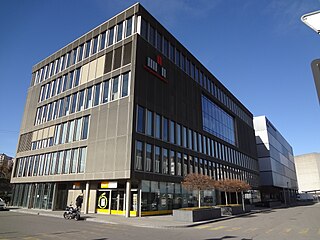A tariff is a tax imposed by the government of a country or by a supranational union on imports or exports of goods. Besides being a source of revenue for the government, import duties can also be a form of regulation of foreign trade and policy that taxes foreign products to encourage or safeguard domestic industry. Protective tariffs are among the most widely used instruments of protectionism, along with import quotas and export quotas and other non-tariff barriers to trade.
Foreign Sales Corporation (FSC) was a type of tax device allowed under the United States Internal Revenue Code that allowed companies to receive a reduction in U.S. federal income tax for profits derived from exports.
A special economic zone (SEZ) is an area in which the business and trade laws are different from the rest of the country. SEZs are located within a country's national borders, and their aims include increasing trade balance, employment, increased investment, job creation and effective administration. To encourage businesses to set up in the zone, financial policies are introduced. These policies typically encompass investing, taxation, trading, quotas, customs and labour regulations. Additionally, companies may be offered tax holidays, where upon establishing themselves in a zone, they are granted a period of lower taxation.
A free-trade zone (FTZ) is a class of special economic zone. It is a geographic area where goods may be imported, stored, handled, manufactured, or reconfigured and re-exported under specific customs regulation and generally not subject to customs duty. Free trade zones are generally organized around major seaports, international airports, and national frontiers—areas with many geographic advantages for trade.
This is a list of international trade topics.

An industrial park, also known as industrial estate or trading estate, is an area zoned and planned for the purpose of industrial development. An industrial park can be thought of as a more heavyweight version of a business park or office park, which has offices and light industry, rather than heavy industry. Industrial parks are notable for being relatively simple to build; they often feature speedily erected single-space steel sheds, occasionally in bright colours.
An international zone is any area not fully subject to the border control policies of the state in which it is located. There are several types of international zones ranging from special economic zones and sterile zones at ports of entry exempt from customs rules to concessions over which administration is ceded to one or more foreign states. International zones may also maintain distinct visa policies from the rest of the surrounding state.
The Liepaja Special Economic Zone is the only special economic zone in the Baltics consisting of a seaport, industrial area and international airport. Liepāja special economic zone was established in 1997 to develop port operations, cargo handling, logistics, manufacturing and air transportation. The goal of the Liepāja SEZ is to attract investments for the development of the port, manufacturing, and creating new working places.

Financial crime is crime committed against property, involving the unlawful conversion of the ownership of property to one's own personal use and benefit. Financial crimes may involve fraud ; theft; scams or confidence tricks; tax evasion; bribery; sedition; embezzlement; identity theft; money laundering; and forgery and counterfeiting, including the production of counterfeit money and consumer goods.

The Royal Malaysian Customs Department ; is a government department body under the Ministry of Finance. RMCD functions as the country's main indirect tax collector, facilitating trade and enforcing laws.

Alabuga is a special economic zone of an industrial and production type located in a 20 km² area in the Yelabuzhsky District of the Republic of Tatarstan in the Kama Innovative Territorial Production Cluster 10 km from Yelabuga, 25 km from Naberezhnye Chelny, 40 km from Nizhnekamsk and 210 km from the regional center — Kazan. The shareholders of the management company of the SEZ "Alabuga" are the Russian Federation through the JSC "Special Economic Zones" with 100% state participation.
The United States imposes tariffs on imports of goods. The duty is levied at the time of import and is paid by the importer of record. Customs duties vary by country of origin and product. Goods from many countries are exempt from duty under various trade agreements. Certain types of goods are exempt from duty regardless of source. Customs rules differ from other import restrictions. Failure to properly comply with customs rules can result in seizure of goods and criminal penalties against involved parties. The United States Customs and Border Protection (CBP) enforces customs rules.

Luxembourg High Security Hub, until 2021 known as Luxembourg Freeport, is a €50-million high security storage facility adjacent to Luxembourg Findel Airport. The freeport opened in September 2014.

Geneva Freeport is a warehouse complex in Geneva, Switzerland, for the storage of art and other valuables and collectibles. It is the oldest and largest freeport facility, and the one with the most artworks, with 40% of its collection being art with an estimated value of US$100 billion.
The Special Economic Zones in Russia are established by the Russian government to attract foreign direct investment. The privileges of special economic zones last for 49 years, and offer their residents a special legal status resulting in a number of tax and customs preferences.

The Golden Triangle Special Economic Zone is located along the Mekong River in the Ton Pheung District of Bokeo Province in Laos. The zone has an area about 3,000 hectares and was created in 2007 by the Lao government together with the Chinese-owned Hong Kong-registered company Kings Romans Group with the hope of generating economic development.
Freeports in the United Kingdom are a series of government assigned special economic zones where customs rules such as taxes do not apply until goods leave the specified zone. The theoretical purpose of such freeports is to encourage economic activity in the surrounding area and increase manufacturing. Critics of such schemes, including the parliamentary opposition, see them as possible tax havens and open to money laundering.






